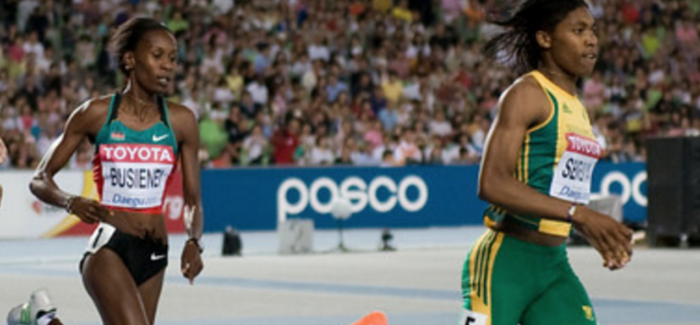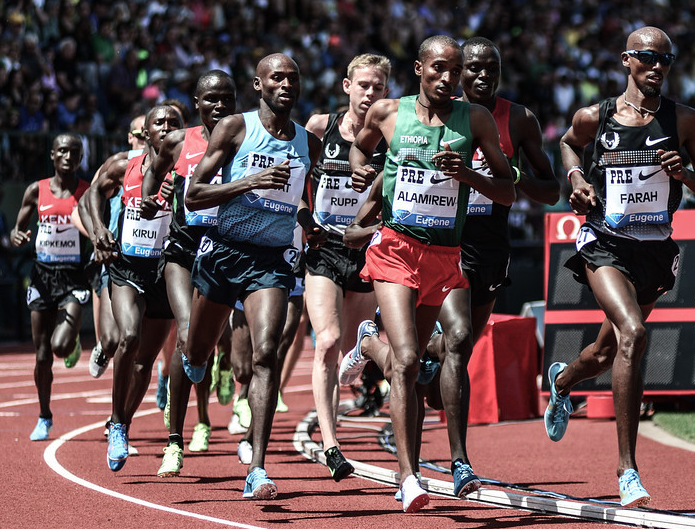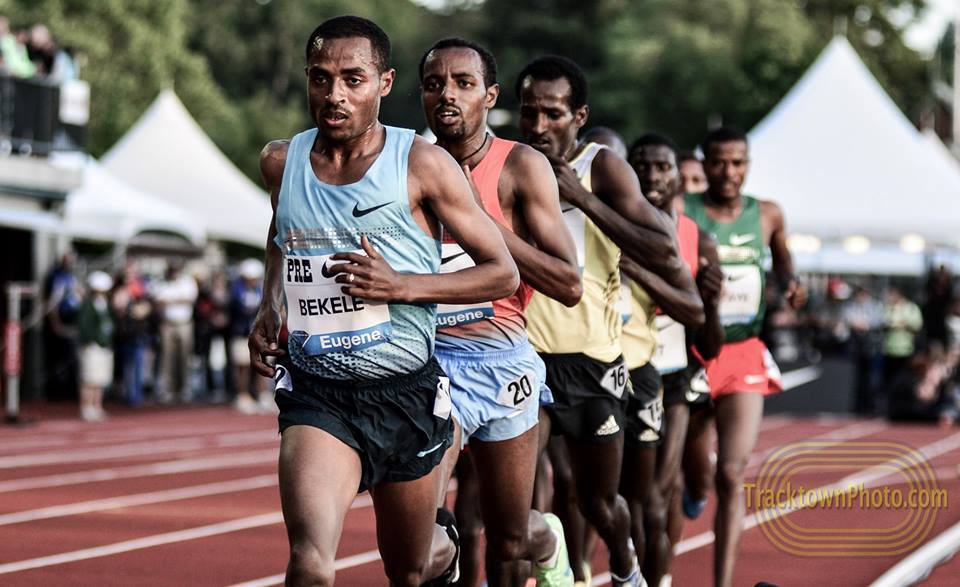Hoka One One recap, Semenya and Ayana roll and Ethiopian marathon selection
Kevin Sully | On 24, May 2016
I spent last Friday evening at the Hoka One One Mid-Distance Classic. In prior years, this meet has hosted an exciting Mo Farah double, Mary Cain’s most impressive record and a cool back-and-forth when Nick Symmonds took a giant check out of Will Leer’s hands after posting the fastest time of the night in the 1500m. Excluding the deluge in 2015, the crowd usually turns out and gets loud on the home stretch. The year Farah ran, hundreds of fans stayed after the meet to watch the Nike Oregon Project workout.
This year it felt flat. I’m not sure what was the difference was. You don’t drive through Friday afternoon traffic in Los Angeles to casually watch a sporting event. The fans in attendance are knowledgeable and are aware what the stakes are in each race, be it A standards of personal bests. It’s not the Pre Classic, but they take it for what it is and immerse themselves in the parade of America’s running around an oddly shaped, poorly lit track for a couple hours.
Friday night was subdued. There was little information coming from the announcers and any attempt to cheer seemed drowned out by the music. There was also less to cheer for. If a meet is set up for fast times, it has to deliver fast times. The fans know the difference between a 3:38 and 3:34.
Olympic Trials qualifying marks are great, but this meet has set a much higher bar for itself. And if the meet is just set up as one large disjointed workout, they need to sell the hell out of that workout with the big names and gimmicks they’ve had in the past. As it was, Boris Berian getting served with a lawsuit by Nike while he was spectating was the most newsworthy moment of the evening. Just like they drew it up.
The Medalists
The top three performances of the weekend….
Gold: Almaz Ayana
Things keep getting harder for Genzebe Dibaba. On consecutive weeks she’s seen women run incredibly quick early season times at her primary distances. In Shanghai, Faith Kipyegon put up a 3:56 in the 1500m.
More concerning for Dibaba will be the looming threat in the 5000m from Ayana. On Sunday, Ayana posted the fifth fastest time ever in the 5000m, running 14:16.31 in what turned into a time trial in Rabat. Both her and Dibaba have excelled in time trial races, but it’s Ayana who upset Dibaba last year at the World Championships.
The Dibaba angle aside, Ayana quietly keeps moving up the all-time list. She now has two marks in the top five and three in the top ten. She was less than two seconds from her personal best on Sunday and didn’t have anyone within 12 seconds of her. Ayana will continue to get overlooked because she doesn’t have the Dibaba name behind her or the world records. But if she beats her in Rio (assuming Dibaba runs the 5000m) then Ayana has two more golds in the 5000m and a faster personal best. And it would be hard to make an argument against her as the best 5000m runner of this era at that point.
Silver: Caster Semenya
Welcome to the women’s middle-distances, the most star-crossed of all the events on the track.
If it isn’t massive doping that reorders finishing places so that making the final means you very well might just get a medal if you wait long enough, then it is a controversy over hormone levels of the best runner in the 800m.
The argument over whether or not Caster Semenya should be competing is well-documented. But she is on the track and abiding by the current rules so we will discuss her as such. Ignoring her, especially as she continues to demolish Diamond League fields, doesn’t seem productive regardless of what position you take on her presence in the race.
In Rabat, she ran 1:56.64 and cruised past from Francine Niyonsaba on the finishing straight. If she keeps running the way she is then those outside the running world (most of your friends) will be familiar with her situation by the time the Olympics roll around. She’s just over a second off her personal best and from there it’s only two seconds to the world record.
Unless her coach decided to peak her for early June, improvement looks imminent. Enough to run 1:53? Maybe. But regardless of time, if the winning margins stay big, the attention will increase. In the lead up to Rio, one of her competitors will comment on Semenya’s case with depth, empathy and perspective. This person’s statements will inevitably be overshadowed by another runner’s shorter, inflammatory and Tweetable opinion on runners with hyperandrogenism. This is the fate of the women’s 800m during the most important year in track and field. But hey, at least Russia might not be there.
Bronze: Caterine Ibarguen
33 wins in a row for the triple jumper after her victory in Rabat. She now stands just 89 victories short of Edwin Moses’s streak of 122 consecutive wins.
Yulimar Rojas, who is supposed to be her closest rival only managed to finish fourth.
Surging….
-Evan Jager’s kick
Prepping for the close of Ezekiel Kemboi et. al, Jager ran a 57 second last lap to win the steeplechase in 8:15.26 at the Hoka One One meet. A fast close isn’t as disproportionately critical as it is in the 1500m, 5000m or 10,000m. But with Kemboi and the other Kenyans somehow finding improbable gears over the final 400m it does seems to be trending that way. Don’t think sit and kick. It’s more like kick and kicker harder.
-NFL brand awareness
The next step for the Buffalo Bills in their quest to play all of their games outside of the US….
How about this for a mashup? Marquise Goodwin rocking the Bills uni while long jumping in #RabatDL – ? BALLIN ? pic.twitter.com/XT2aRD3Ir8
— Marvs and Recreation (@AdamGOestreich) May 22, 2016
-American Women’s 800
Gold in the 800m seems a long way away with Semenya and Niyonsaba. That fact doesn’t diminish how entertaining the women’s 800m will be at the U.S.
I’ve written about this approximately 22 times in the past two years, but Laura Roesler and Brenda Martinez’s battle to the line at Oxy refreshed my memory. Roesler won, 2:00.15 to 2:00.18. Still waiting for the first American to break two minutes in 2016.
-Hassan Mead’s range
With all the 1500m specialists in attendance, I didn’t think Mead would put up the fastest time of the night. America’s second best 10,000m runner put up a 3:37.65 to win what ended up being the top heat of the evening.
-Eric Jenkins
Like Jager, the close was the most impressive part. Jenkins last lap of 55 seconds took him from amidst a small group to out into his lonesome. The time of 13:24.67 was secondary to that finish and is oh so useful in a championship style race. If Galen Rupp sticks to just the 10,000m at the Olympic Trials, that opens up a top three spot. I expect Ryan Hill to snag one of those three, but after that there is at least five men, and maybe more, who could be in contention on the bell lap.
-Kate Grace
Each spring of an Olympic year there is a ascendent American runner who is running so well that you have to wonder if they wish they waited just a month more before. I mean, you never want to shoo off a personal best, but I could see getting a little greedy and not only wanting to run fast but wanting to run fast at the right time. Kate Grace ran 4:05.65 at the Hoka One One meet, her best time ever. Put this win against her along with her 2:00 800m earlier this season and everything looks to be heading in the right direction six weeks before the Olympic Trials.
-Non-Kiprop Kenyan 1500m runners
Timothy Cheruiyot and Silas Kiplagat went 1-2 in Rabat running 3:33.61 and 3:33.68. I assume this means that Asbel Kiprop would have run at least 3:33.60.
-Marathoners left off their Olympic team
Kenenisa Bekele beat Wilson Kipsang in the Great Manchester 10K, with Bekele putting up a 28:07 and Kipsang keeping the margin close finishing in 28:15. Bekele was named an alternate when the Ethiopian marathon team was announced over the weekend. If he still wants to compete in Rio, his most likely path is in the 10,000m. Kipsang, who was left off the Kenyan squad the previous week, doesn’t have similar success on the track so he will have to settle for getting a boatload of money for a fall marathon.
The more consequential result from Manchester came in the women’s race. Tirunesh Dibaba came back from two years away from running to put up a 31:16 victory. We are well on our way to an Olympics with a full complement of Dibabas. Between the 5000m and 10,000m they will try to divide and conquer Ayana. I don’t care that Tirunesh will have less than three months of racing over the past 24 months when it comes time for Rio. That’s too much Dibaba for any one person to take.
Slowing….
-Ethiopian Olympic marathon selection
Ethiopia announced their team for Rio. It doesn’t include Atsede Baysa (this year’s women’s Boston champion), Kenenisa Bekele (3rd this year in London, in addition to his bucket of gold medals) or Lelisa Desisa (Ethiopia’s most consistent marathoner of the past four years).
Instead they went with Mare Dibaba, Aberu Kebede and Asefelech Mergia for the women and Feyisa Lelisa, Lemi Berhanu and Tesfaye Abera for the men’s. That men’s team looks great on a start list, but is operating at less than full capacity without Desisa. These decisions should be merit based, and you could have made an argument for including Bekele that doesn’t even mention his world records. Lelisa, Berhanu and Abera all won marathons this year. But a victory in Tokyo, Dubai, or this year’s Boston field isn’t any more impressive than Bekele’s third place in London against the best competition of 2016.
The women’s team isn’t as egregious as the men’s picks though it is completely contradictory to the men’s choices. Baysa and Tirfi Tsegaye won in Boston and Dubai, the exact same accomplishments as Berhanu and Abera, and they were left off the team. The women’s field in Boston was even stronger than the men’s and yet the selectors seemed to give it more weight. Ethiopia’s under-thinking their marathon selection and relying too much on fast times is a nice complement to Kenya’s overthinking when choosing a squad. Through a series of non-sensical decisions, they both give the rest of the world a chance in the marathon.
-Leo Manzano
He ran 3:43.86 and finished last in his heat of the 1500m in Los Angeles. Manzano has always bounced between great and sub-par. Usually, he finds himself on the better side of things when it matters most. These next six weeks will be interesting to see if he can go from 3:43 to making the Olympic team.
-Fun Bolt
He ran 9.98 in Ostrava. Like his 10.05 debut, he was not satisfied with the result. He actually looks far ahead of where he was last year at this time so I’m not entirely sure what all the shrugs and head shaking is about after the race. I know he said he wanted to run 9.8, but I miss fun Bolt. We still see him at the start line, but he hasn’t made his debut at the finish in 2016.
Is it going to take another 9.79 before we get this again?
– 400m races without two the big three
Lashawn Merritt won by .6 in Rabat. The race was a little more interesting than that margin signifies because Merritt chased down a dying Isaac Makwala in the last 100. Still, it was over once Merritt decided to start rolling (or when Makwala decided to start out that fast).
We don’t want half-a-second margins in Diamond League races. Not when Merritt, Kirani James and Wayde Van Niekerk have the potential to make sweet, sweet quarter mile music when they are on the track together.
-Nijel Amos
You didn’t worry when Nick Symmonds ran 1:47 in Beijing, so why panic when Amos ran 1:47.34 for sixth in Rabat? That’s an easy one. Symmonds didn’t take a year off to become a DJ.



















Submit a Comment